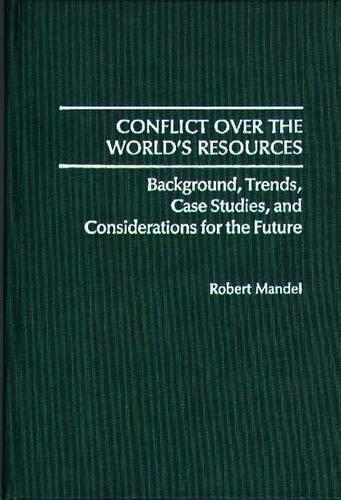
Conflict Over the World's Resources: Background, Trends, Case Studies, and Considerations for the Future
(Hardback)
Publishing Details
Conflict Over the World's Resources: Background, Trends, Case Studies, and Considerations for the Future
By (Author) Robert Mandel
Bloomsbury Publishing PLC
Praeger Publishers Inc
24th October 1988
United States
Classifications
Tertiary Education
Non Fiction
Environmental management
Pollution and threats to the environment
333.7
Physical Properties
Hardback
156
Description
As resource scarcity threatens and the economic gap between affluent and poorer nations continues to widen, conflict over natural resources is assuming critical dimensions. The text analyzes the causes and consequences of present tensions and offers case studies of five recent or ongoing resource conflicts that illustrate major areas of confrontation and identify the range of policy issues we need to confront. The author first describes worldwide scarcity trends and trends in resource conflict and their relation to international conflict as a whole, looking at the dynamics of resource competition, assessing the impact of scarcity, declining economic development, environmental awareness, resource interdependence and other factors. Case studies focus on political coercion in the conflict over food; the scarcity of strategic minerals and competition to control them; and the conflict arising from nuclear pollution in the wake of the Chernobyl disaster. The concluding chapter, dealing with policy implications, explains why prevailing attitudes toward resources are counterproductive and suggests ways of working more effectively to minimize international resource conflict.
Reviews
As resource scarcity threatens, the economic gap between affluent and poorer nations continues to widen and the conflict over natural resources is assuming critical dimensions. The author analyzes the causes and consequences of present tensions.-Abstracts of Development Studies
This useful refresher on one of the oldest subjects in international relations tests general ideas against case studies of recent experience in whaling, oil, grain, strategic minerals, and pollution (Chernobyl). The prescriptions for policies to avoid conflicts are sensible.-Foreign Affairs
"As resource scarcity threatens, the economic gap between affluent and poorer nations continues to widen and the conflict over natural resources is assuming critical dimensions. The author analyzes the causes and consequences of present tensions."-Abstracts of Development Studies
"This useful refresher on one of the oldest subjects in international relations tests general ideas against case studies of recent experience in whaling, oil, grain, strategic minerals, and pollution (Chernobyl). The prescriptions for policies to avoid conflicts are sensible."-Foreign Affairs
Author Bio
ROBERT MANDEL is Professor of International Affairs at Lewis and Clark College. His publications include Perception, Decision Making, and Conflict and Irrationality in International Confrontation (Greenwood Press, 1987), as well as journal artcles on world politics, conflict resolution, and related areas.
